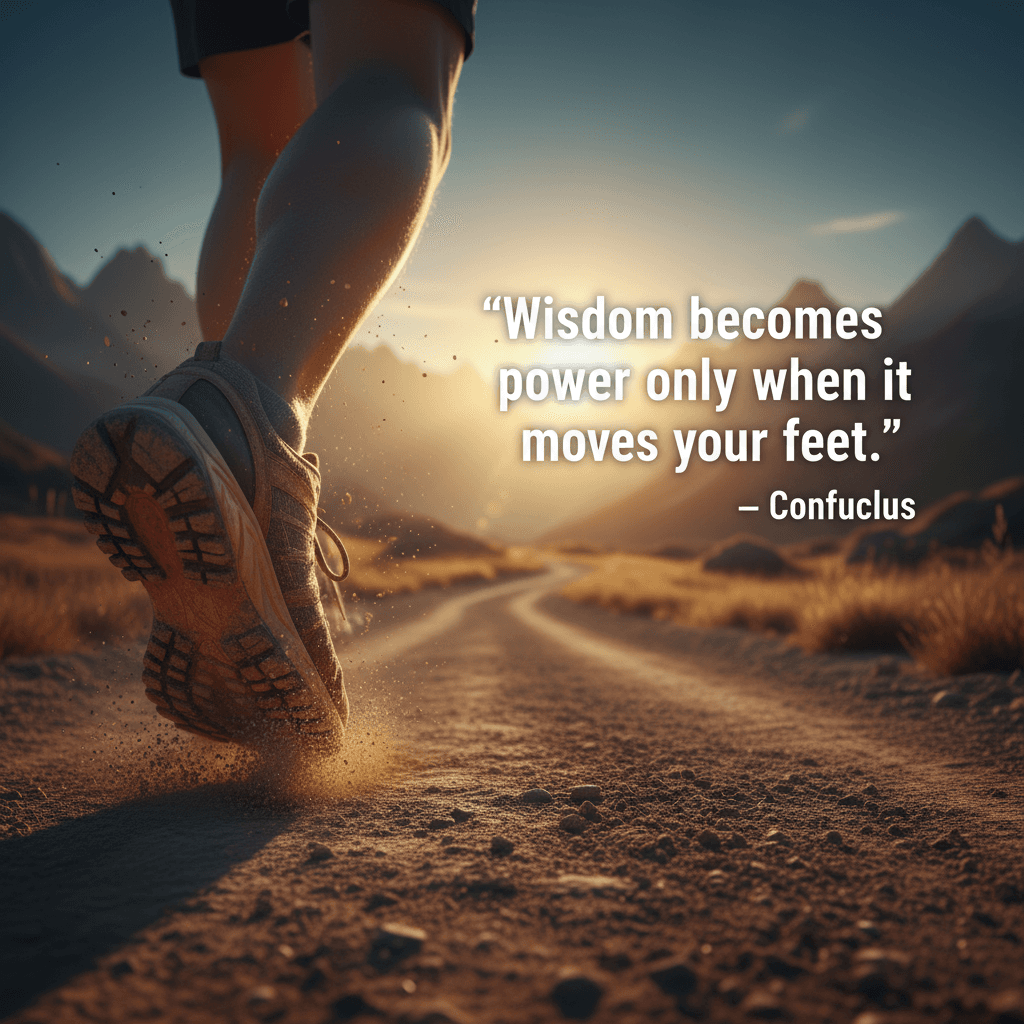When Wisdom Moves Your Feet, Power Follows

Wisdom becomes power only when it moves your feet. — Confucius
From Insight to Kinetic Power
At its core, the saying insists that knowledge is inert until it compels motion. Advice, plans, and principles may illuminate paths, but only steps taken convert potential into power. Thus, wisdom becomes less about what we can recite and more about what we can carry into the world. By shifting focus from contemplation to movement, the line reframes intelligence as a force measured by outcomes, not by eloquence.
Confucian Roots of Doing Over Saying
Historically, the sentiment aligns with Confucian ethics, which prize embodied virtue. The Analects cautions that the exemplary person is ‘modest in speech but exceeds in actions’ (Analects 14.27) and that ‘seeing what is right and not doing it is a lack of courage’ (Analects 2.24). Later, Wang Yangming sharpened this into the doctrine of the unity of knowledge and action, arguing that knowing divorced from doing is incomplete (Instructions for Practical Living, c. 1520). In this lineage, wisdom matures only when it is practiced.
Leadership: Steps, Not Speeches
In practice, leadership proves the rule. Amid London’s 1854 cholera outbreak, John Snow’s insight about contaminated water did not gain power until he walked to Broad Street and removed the pump handle. That small, physical act translated contested knowledge into community protection. Likewise, effective leaders habitually transform briefings into behaviors—deploying pilots, shipping prototypes, or visiting front lines—because motion cuts through ambiguity and mobilizes others.
Closing the Intention–Action Gap
Psychologically, many people stall between knowing and doing. Research on implementation intentions shows that if–then plans (‘If it is 7 a.m., then I run’) markedly increase follow-through (Peter Gollwitzer, 1999). Meta-analyses confirm that intentions alone often explain far less behavior than we expect (Paschal Sheeran, 2002). Moreover, habit studies indicate that consistent repetition in stable contexts automates actions over time (Phillippa Lally et al., 2010). Thus, wisdom gains power when we engineer situations where action becomes the default.
Translating Wisdom into Motion
Consequently, practical translators matter more than grand resolutions. Define the next visible step, not the whole journey; time-box it on a calendar so the when is decided; reduce friction by laying out tools in advance; and enlist social commitment with a public promise or a partner. Even micro-steps—two-minute starters, quick drafts, tiny experiments—convert abstract insight into irreversible momentum. Once the feet move, the mind entrains to keep pace.
Courage: The Moral Motor
Yet movement is not merely mechanical; it is moral. Analects 2.24 ties right action to courage, implying that hesitation often masks fear, not prudence. History’s pivotal shifts underscore this: Rosa Parks’s refusal to yield her seat (Montgomery, 1955) and Gandhi’s Salt March (1930) were modest motions that crystallized vast principles into public power. In each case, wisdom crossed the threshold of risk—and thereby changed the world.
Make It a Loop, Not a Leap
Finally, power deepens when action cycles back into learning. Pragmatism, as William James argued in Pragmatism (1907), holds that ideas are validated in their consequences; outcomes thus refine the next act. By iterating—act, observe, adjust—we convert initial wisdom into durable capability. In this loop, movement is not the end of thought but its amplifier, ensuring that what we know keeps improving how we walk.